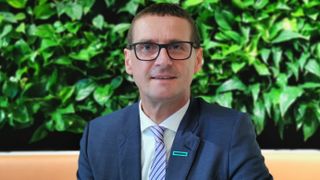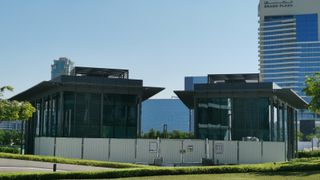HPE invests about $10m in Saudi Arabia and UAE to attain double-digit growth
Aims to make Digital Life Garage as the next Silicon Valley to help Middle East region transform digitally to next level

Hewlett Packard Enterprise (HPE) is investing close to $10m in UAE and Saudi Arabia in a bid to achieve double-digit growth in the Middle East region.
Right now, the region contributes about 3% but the US company is taking the right pills to attain more than 10% growth.
HPE is the enterprise technology business unit that was split off from HP’s PCs and printer division in 2015.
Speaking to TechRadar Middle East, Wolfgang Egger, Vice-President and Managing Director of HPE Middle East and South Africa, said that the three growth focus areas are edge computing, hybrid computing and GreenLake [everything-as-a-service].
“We strongly believe that we are bringing value to this region. We see the Middle East as a growth region and big investments are going into the region. We have two offices in the UAE – one in Dubai and Abu Dhabi. One office in Riyadh, Saudi Arabia, Qatar, Egypt and has a presence with partners in Bahrain, Kuwait, Oman, Lebanon, Jordan, Iraq and Libya,” he said.
With the acquisition of supercomputing leader Cray, he said that it will bring them to the next level by having Cray’s interconnected software components, intellectual property of Cray.
HPE, which is a leader in the HPC server market, is strengthening its position against its two rivals – Dell and IBM – with the acquisition of Cray for $1.3b last year.
Are you a pro? Subscribe to our newsletter
Sign up to the TechRadar Pro newsletter to get all the top news, opinion, features and guidance your business needs to succeed!
“The region is expected to have Cray computers this year and will help in AI use cases and big data analytics in UAE and Saudi Arabia. The combination of HPE and Cray will deliver significant customer benefits and future offerings and will create greater growth opportunities for us,” he said.
HPE has high-performance computers in the region and sees UAE, Saudi Arabia, Egypt and Qatar offering opportunities for growth.
“We are in a position to sell supercomputing products to the governments, universities and corporate clients to address the full spectrum of their data-intensive requirements,” he said.
- Digital transformation and innovation accelerators to fuel enterprise IT spending
- Top five trends that will shape the technology sector in UAE in 2020
- Adoption of AI in Middle East may slow down due to some key challenges
- Business leaders urged to leverage potential of fourth industrial revolution
GreenLake model by 2022
As HPE is aiming to become an edge-to-cloud platform-as-a-service provider, he said that the company is investing $5b globally to improve the user experience at the edge.
“We strongly believe that within two years, 75% of the data generated at the edge will never see a data centre to compute the data. We help customers in the region to decide what can go to the cloud and what cannot. We call it a ‘right mix advisor’ and it is an HP intellectual property. Our software can access the company’s environment and help them in their cloud journey,” he said.
Talking about GreenLake, which is a consumption-based offering and unique to the industry, he said that customers can commit a certain amount of hardware and storage for on-premise and pay a monthly fee.
“The software intelligence monitors what is going on the system, whether it is utilised more or less. If it is utilised more, we provide more capacity to scale up and the client pays for that. If it is over utilised, we provide more capacity to scale up and the client pays for that. Customers can experience the same cloud-like benefits at their on-premises environment and give the flexibility of the public cloud,” he said.
Moreover, he said that the company aims to sell everything [hardware, storage, services, solutions] on GreenLake by 2022 and “we are transforming the whole company to that model.”
GreenLake, launched 10 years ago, is on version 3.0 and can help customers save money in a constrained environment and the company has big customers on the platform from the region.
Egger said that HPE does not offer public cloud services in the region but enables its customers and service providers to that.
“We have signed a memorandum of understanding with Dubai Electricity and Water Authority’s Moro data centre last year and are the partner to deliver cloud services in the UAE,” he said.
When asked whether the cloud industry will move from a centralised cloud to a decentralised cloud format, he said that centralised cloud providers are increasing capacity but both will exist for sure.
Furthermore, he said that the on-premise cloud will stay and the model for the future will be hybrid.
“We will make it easy for customers to move from on-premise to the cloud and vice versa,” he said.

HPE, which has moved to a new regional office at Dubai Internet City, is investing in people, Digital Life Garage in Dubai and an Innovation Centre in Saudi Arabia.
“The investments in Saudi Arabia and the UAE will bear fruit as the countries have big visions going forward and they are focusing on innovation and want to stay at the forefront of technological adoption,” he said.
Digital Life Garage is a garage to co-innovate and accelerates companies on their digital journeys.
He said that HPE has developed its methodology to help customers in a workshop to define their innovation strategy.
Local partners for the garage will include UAE government entities, local start-ups and larger enterprises, research partners and other relevant market players.
“HP was founded in a garage at Palo Alto 80 years ago, the founding place of Silicon Valley. We aim to make Digital Life Garage as the next Silicon Valley to help the region to transform digitally to the next level,” he said.
“The garage has technology showcases and knowledge development. We will train Emiratis, by having tie-ups with universities, on software and solutions,” he said.
Both the Digital Life Garage and the Innovation Centre in Saudi Arabia are expected to be opened by April.
Most Popular

